Mohammad Afzal Shadab is a PhD Student in the Oden Institute’s Computational Science, Engineering and Mathematics (CSEM) program. He is also President of the Society for Industrial and Applied Mathematics - UT Austin Chapter, and was awarded the 2020-21 SIAM Student Chapter Certificate of recognition for Outstanding Contributions to the UT Student Chapter. Here he explains how he managed to achieve so much in the midst of a pandemic.
I am a second-year doctoral student at the Oden Institute, working under the supervision of Dr. Marc Hesse. I am working through a NASA Emerging World grant entitled Multi-phase melt percolation during core formation, which broadly includes the development of a conservative finite-difference scheme-based solver to simulate two-phase fluid flow in a deformable porous medium. Its applications include investigating the mechanism behind the formation of cores in planetesimals (young planets) and post-impact hydrothermal systems on Mars.
I was recently awarded a UT Institute for Geophysics graduate student fellowship to study the effects of global warming on ice caps using the same simulator.
I took over as the SIAM UT chapter’s president six months ago. Since then my team and I have been working tirelessly to grow our online presence, build strong industrial & academic connections, and ultimately support the applied mathematics and computational science community at UT and beyond. We spearheaded several live-streaming events like the SIAM Distinguished Speaker Seminar Series, and invited several highly-acclaimed academicians to speak. We organized industry talks for skills development and career opportunities and developed our signature Applied Mathematics Mentorship program for UT undergraduates.
Moreover, we relaunched our new website (siam.oden.utexas.edu) with a plethora of new resources for students, such as scholarships’ information and presentation tips. All of this during a global pandemic.
Being a fluid dynamics and computational physics enthusiast, I joined the Oden Institute’s Computational Science, Engineering and Mathematics doctoral program hoping to learn the crucial tools in computational science and concepts in applied mathematics. I was also excited to utilize Texas Advanced Computing Center resources to investigate and solve real-world problems in fluid flows. The well-designed curriculum of the CSEM doctoral program has rigorously trained me with the theoretical and computational skills essential for impactful research. Armed with knowledge and experience from the program, I will keep striving for what I love: solving real-world problems and making the world a better place.
